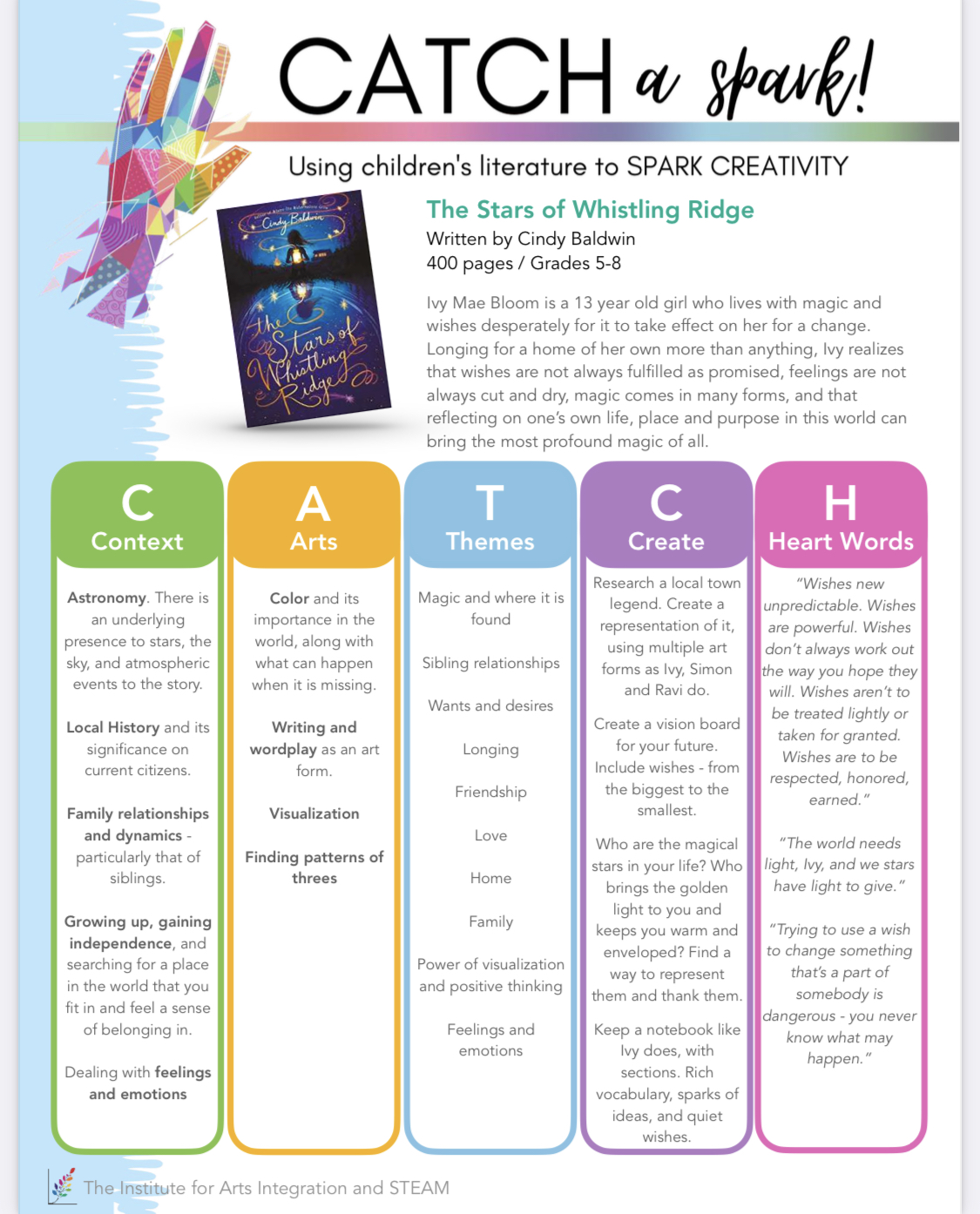The Stars of Whistling Ridge Classroom Resources
Discussion Questions for The Stars of Whistling Ridge
(You can download a printable PDF copy of these discussion questions here!)
-
More than anything in the world, Ivy wants a “forever home”—a place she can put down roots. Ivy’s willing to do a lot of things to get what she wants, even if some of those things might hurt her or or family. Have you ever wanted something so badly you were tempted to make unwise choices to get it?
-
Ivy has very specific ideas about what “home” means—she even keeps a list at the back of her writing notebook full of the things she hopes for (page 10). What things make a place feel like home to you? If you made a list like Ivy’s, what would be on it?
-
Even though Ivy’s mama has the ability to reawaken the wishing magic in fireflies, the Bloom family is very careful about how they use wishes (pages 38-39). Mama explains to Ivy that relying too much on wishes can “take something from you.” Do you agree with this? How do you think being able to solve all your problems with magic might change you as a person? Do you think you would try it, if you could?
-
Ivy has asthma and her younger sister, Elena, has an anxiety disorder. When Ivy asks Mama why they can’t use wishes to heal Elena’s anxiety, Mama says, “Elena is perfect the way she is… I’d no sooner wish away her anxiety than I’d wish away your asthma” (page 132). What do you think Mama means? Do you think that we can find ways for our differences to be strengths, even if they might be hard at times?
-
Throughout the book, Ivy notices a little wren building a nest on top of the RV. At first, she tries to shoo it away, but the bird persists and eventually completes its nest. When it’s time for the Bloom family to move on from Whistling Ridge, Daddy decides to build an enclosure to keep the nest and its inhabitant safe while the RV is in motion. In what ways do you think the wren on top of the RV is used as a symbol in the story? In what ways is Ivy similar to, and different from, the wren? (One possible explanation can be found on page 378.)
-
Ivy wants to be a writer, and carries a notebook with her everywhere she goes to jot down thoughts and ideas that come to her. How do you think Ivy’s desire to improve her writing influences her story? Do you think Ivy notices different things when she’s carrying her notebook? What skills is Ivy cultivating that you think will make her a better writer?
-
In her writing notebook, Ivy keeps a list of words she loves with their definitions. Are there words you’ve heard that you think are especially cool—whether because of how they sound or what they mean? Make a list of 10 words that you love and write their definitions. Use your word list to write a poem, short story, or nonfiction paragraph about something you find interesting. Do you think using “big words” is fun, or frustrating? Are there times where it’s helpful to use more advanced vocabulary? Are there times where it’s unhelpful?
-
Shortly after she arrives in Whistling Ridge, Ivy learns the story of Lydia Lovelace—but as the book goes on and Ivy learns more about the real Lydia, she realizes that some of the things people in Whistling Ridge have accepted as fact are incorrect. How does what Ivy learns about Lydia’s story change your understanding of who Lydia was and the choices she made? Do you think knowing the true story of Lydia Lovelace is helpful for Ivy? Why? Have you ever had an experience where you learned that a story from history or from your family was more complicated than you knew at first? How did that make you feel?
-
Can you find examples of figurative language, such as simile and metaphor, in The Stars of Whistling Ridge? What role do you think figurative language plays in building up Ivy’s voice?
-
At the end of the book, Ivy and her family have to make a big sacrifice to help stop the magic draining away from Whistling Ridge. Have you ever lost a friend or relative who was important to you? Were there ways that you found to remember them and see them in the world around you, even when they were gone, the way Ivy does?
-
History Extension: Although Lydia Lovelace is fictional, there are many real-life historical figures whose stories leave out important or interesting facts. Pick one historical figure to research, and try to find at least 3 things about them you didn’t know before. (Some of my favorite historical figures with surprising, little-known backstories include Alexandre Dumas and Helen Keller.)
-
Geography Extension: Although most of the book takes place in the fictional town of Whistling Ridge, North Carolina, Ivy’s family frequently moves around in Martha, their Winnebago RV. Besides North Carolina, other states mentioned in the book include Montana (where Aunt Ruth lives), Alabama (where Daddy’s from), Louisiana (where the Blooms were just before the book opens), and Oklahoma (where the Blooms are at the beginning of the book.) Have you visited any of these states? Pick two states from this list and do some research on them. How are they similar? How are they different? Are they close to the place you live, or far away? What do you think it would be like to move from place to place all the time, the way Ivy’s family does?
Activity Guide by the Institute of Arts Integration and STEAM.
This wonderful activity guide for The Stars of Whistling Ridge was created by the Institute of Arts Integration and STEAM.






